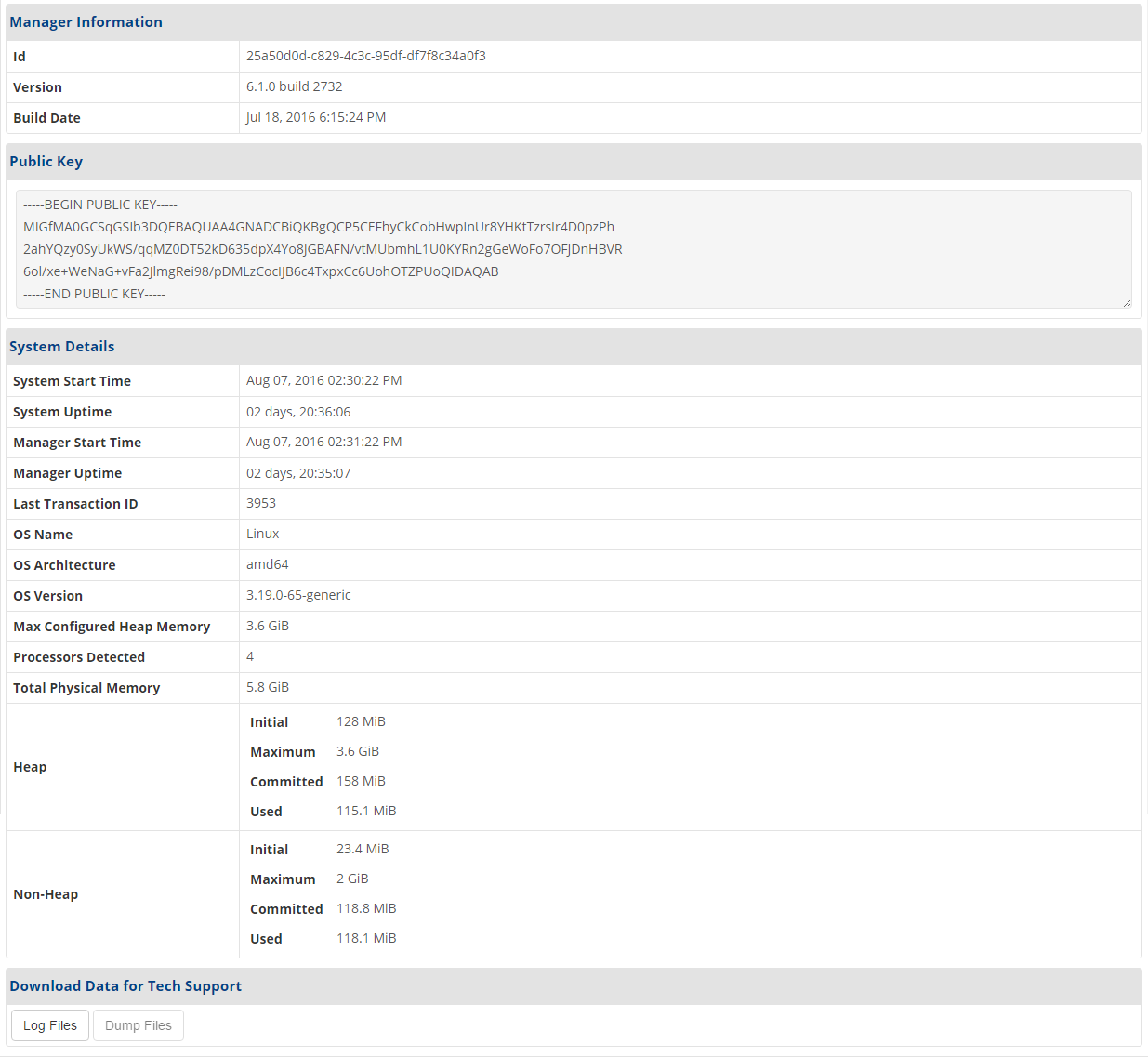The Manager Information screen displays useful manager, license, and system information concerning your Server Backup Manager system. To access this screen, click Manager Information in the Advanced Options section of the Main Menu.

The following sections display on this screen:
Manager Information
This section provides the ID, version, build number, and build date of the Server Backup Manager build that is currently installed.
Public Key
This section provides the public key that can be copied if needed.
DCC Information (if installed)
If the Data Center Console (DCC) is installed, this section displays the URL of the DCC and the identification number of the most recent DCC transaction.
System Details
The following details display in the System Details section:
- System Start Time. The time and date when the system was started.
- System Uptime. The amount of time since installation that the system has been up and running.
- Manager Start Time. The time and date when the SBM was started.
- Manager Uptime. The amount of time since installation that the SBM has been up and running.
- Last Transaction ID. The identification number of the most recent transaction.
- OS Name. The name of the operating system (OS) installed on the computer, such as Linux or Windows.
- OS Architecture. The conceptual structure of the OS installed on the computer, such as amd64 or x86.
- OS Version. The version of the OS installed on the computer, such as 3.19.0-65-generic or 6.1.
- Max Configured Heap Memory. The maximum heap size configured on the computer, in gibibytes (GiB).
- Processors Detected. The total number of processors detected on the computer.
- Total Physical Memory. The total amount of physical memory on the computer.
- Heap. The current task heap memory usage.
- Initial. The amount of heap memory initially allocated to the Backup Manager.
- Maximum. The maximum heap size allocated to the Backup Manager by default in the server.conf file.
- Committed. The amount of heap memory committed to use by the Backup Manager.
- Used. The amount of heap memory in use by the Backup Manager. This value can help you to check available memory for new tasks.

Tips
Keep new tasks from launching when the Backup Manager system memory is too low. We highly recommend you use caution when adjusting these settings.
- Non-Heap. The current non-task heap memory usage.
- Initial. The amount of non-task heap memory initially allocated to the Backup Manager.
- Maximum. The maximum non-task heap size allocated to the Backup Manager by default in the server.conf file.
- Committed. The amount of non-heap memory committed to use by the Backup Manager.
- Used. The amount of non-task heap memory in use by the Backup Manager. This value can help you to check available memory for new tasks.
The Windows subsystem on Windows NT provides high-level memory management functions that make it easy for applications to build dynamic data structures, provide compatibility with previous versions of Windows, and create buffers and temporary placeholders for system functions. These memory management functions return handles and pointers to blocks of memory that are allocated at run time and managed by an entity called the heap. The heap's primary function is to efficiently manage the memory and address space of a process for an application.
Heap memory stores all instances or attributes, constructors, and methods of a class/object. For more information about using heap memory, see Configure heap memory.
Download Data for Tech Support
The Download Data for Tech Support feature streams a .zip file of the logs directory. Click the Log Files button in this section to download this file, which contains the /logs and /conf directories.
For more information on downloading files for R1Soft Technical Support detailed information about the /logs and /conf directories, see Download data for Technical Support.
